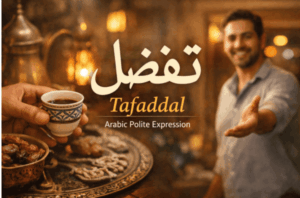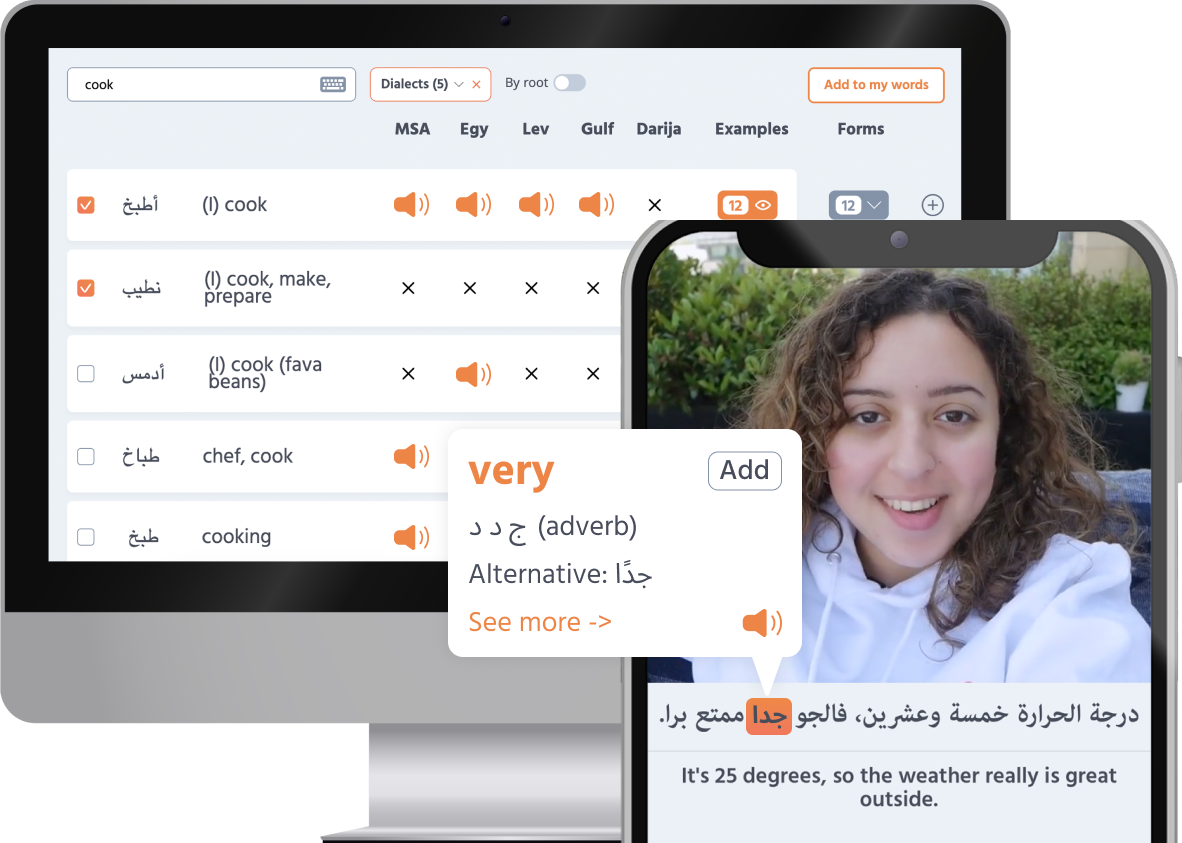Adjectives in the Arabic language add depth and detail to descriptions, helping to express qualities, quantities, and states in conversations and written language. In this article, we’ll look at how adjectives are used in Arabic, the types of adjectives, and some specific ways to modify and compare them.
What are adjectives in Arabic? An adjective (صفة)
is a word that describes a noun, such as جميل
(pretty), قوي
(strong), or سعيد
(happy). In Arabic , adjectives are essential for conveying emotions, characteristics, and qualities, helping listeners or readers visualize and understand the specifics of a noun. They can describe things, specify particular items, or provide additional context, such as الكتاب القديم
(the ancient book) versus الكتاب
(the book).
In Arabic , adjectives are placed after the nouns they modify, and they can be transformed using the prefix ال
to make them definite when they describe a definite noun. Additionally, adjectives agree in gender and number with the nouns they describe. We are going to discuss nouns – adjectives agreement in Arabic in more detail in a separate article.
Types of Adjectives in Arabic Arabic adjectives can be grouped into various types, each with specific uses:
Descriptive adjectives Descriptive adjectives describe the qualities or states of people, objects, or things. They include several subtypes such as physical adjectives , qualitative or personality adjectives , and emotional adjectives —words that express a person’s emotional state, whether positive or negative. These adjectives change form based on gender (masculine/feminine) and number (singular/plural), and are widely used in both Modern Standard Arabic (MSA) and spoken varieties.
Note: In Arabic, plural adjective endings often reflect gender. The ات
ending is typically used for feminine plurals , while ون
or ين
are common for masculine plurals . To learn more about how plurals are formed in Arabic, check out our full article here: Plural Formation in Arabic
Here are some examples across different Arabic varieties: Modern Standard Arabic Levantine Egyptian Gulf Darija
In Standard Arabic
Click to view
English Masculine Feminine Plural happy سعيد
سعيدة
سعداء
optimistic متفائل
متفائلة
متفائلين
comfortable مرتاح
مرتاحة
مرتاحين
enthusiastic متحمس
متحمسة
متحمسين
active نشيط
نشيطة
نُشطاءُ
sad حزين
حزينة
حزانى
pessimistic متشائم
متشائمة
متشائمين
annoyed متضايق
متضايقة
متضايقين
angry غاضب
غاضبة
غاضبين
lazy كسلان
كسلانة
كسالى
Get free Arabic videos with interactive captions for your level
Get free videos
In Levantine
Click to view
English Masculine Feminine Plural happy مبسوط
مبسوطة
مبسوطين
optimistic متفائل
متفائلة
متفائلين
comfortable مرتاح
مرتاحة
مرتاحين
enthusiastic متحمس
متحمسة
متحمسين
active نشيط
نشيطة
نشيطين
sad زعلان
زعلانة
زعلانين
pessimistic متشائم
متشائمة
متشائمين
annoyed متضايق
متضايقة
متضايقين
angry معصّب
معصّبة
معصّبين
lazy كسلان
كسلانة
كسلانين
This clip from a Jordanian video showcases a traditional Jordanian custom — don’t miss the ending! In Egyptian
Click to view
English Masculine Feminine Plural happy مبسوط
مبسوطة
مبسوطين
comfortable متفائل
متفائلة
متفائلين
relaxed مرتاح
مرتاحة
مرتاحين
enthusiastic متحمس
متحمسة
متحمسين
active نشيط
نشيطة
نشيطين
sad زعلان
زعلانة
زعلانين
pessimistic متشائم
متشائمة
متشائمين
annoyed متضايق
متضايقة
متضايقين
angry متعصّب
متعصّبة
متعصّبين
lazy كسلان
كسلانة
كسلانين
Notice the Egyptian adjective used in this clip from an interview between an Egyptian host and a famous Kuwaiti child. In Gulf
Click to view
English Masculine Feminine Plural happy مبسوط
مبسوطة
مبسوطين
optimistic متفائل
متفائلة
متفائلين
comfortable مرتاح
مرتاحة
مرتاحين
enthusiastic متحمس
متحمسة
متحمسين
active نشيط
نشيطة
نشيطين
sad زعلان
زعلانة
زعلانين
pessimistic متشائم
متشائمة
متشائمين
annoyed متضايق
متضايقة
متضايقين
angry معصّب
معصّبة
معصّبين
lazy كسول
كسولة
كسولين
In Darija
Click to view
English Masculine Feminine Plural happy فرحان
فرحانة
فرحانين
optimistic متفائل
متفائلة
متفائلين
comfortable مرتاح
مرتاحة
مرتاحين
enthusiastic متحمس
متحمسة
متحمسين
active نشيط
نشيطة
نشيطين
sad حزين
حزينة
حزينين
pessimistic متشائم
متشائمة
متشائمين
annoyed معصّب
معصّبة
معصّبين
angry معصّب
معصّبة
معصّبين
lazy معجاز
معجازة
معاجيز
Pay attention to the word معصّب mentioned in the video and learn one of the modern expressions we use when angry in Gulf Arabic. Physical adjectives They are used to describe physical attributes of people or objectives.
In Standard Arabic
Click to view
English Masculine Feminine Plural strong قوي
قوية
أقوياء
weak ضعيف
ضعيفة
ضُعَفاءُ
tall طويل
طويلة
طوال
short قصير
قصيرة
قصار
big كبير
كبيرة
كبار
small صغير
صغيرة
صغار
wide واسع
واسعة
واسعين
tight ضيق
ضيقة
ضيقين
blonde أشقر
شقراء
شقر
fast سريع
سريعة
سِراع
slow بطيء
بطيئة
بطيئون
dark-skinned أسمر
سمراء
سمر
blind أعمى
عمياء
عميان
deaf أطرش
طرشاء
طرش
mute أخرس
خرساء
خُرس
bald أصلع
صلعاء
صلع
Three adjectives in Modern Standard Arabic are mentioned in this clip — can you spot them? In Levantine
Click to view
English Masculine Feminine Plural strong قوي
قوية
أقويا
weak ضعيف
ضعيفة
ضعاف
tall طويل
طويلة
طوال
short قصير
قصيرة
قصيرين
big كبير
كبيرة
كبار
small صغير
صغيرة
صغار
wide واسع
واسعة
واسعين
tight ضيق
ضيقة
ضيقين
blonde أشقر
شقرا
شقر
fast سريع
سريعة
سريعين
slow بطيء
بطيئة
بطيئين
dark-skinned أسمر
سمرا
سمر
blind أعمى
عميا
عميان
deaf أطرش
طرشا
طرش
mute أخرس
خرسا
خرس
bald أصلع
صلعا
صلع
In Egyptian
Click to view
English Masculine Feminine Plural strong قوي
قوية
أقويا
weak ضعيف
ضعيفة
ضعاف
tall طويل
طويلة
طوال
short قصير
قصيرة
قصيرين
big كبير
كبيرة
كبار
small صغير
صغيرة
صغار
wide واسع
واسعة
واسعين
tight ضيق
ضيقة
ضيقين
blonde أشقر
شقرا
شقر
fast سريع
سريعة
سريعين
slow بطيء
بطيئة
بَطَأَة
dark-skinned أسمر
سمرا
سمر
blind أعمى
عميا
عمي
deaf أطرش
طرشا
طرش
mute أخرس
خرسا
خرس
bald أصلع
صلعا
صلع
In Gulf
Click to view
English Masculine Feminine Plural strong قوي
قوية
أقويا
weak ضعيف
ضعيفة
ضعيفين
tall طويل
طويلة
طوال
short قصير
قصيرة
قصار
big كبير
كبيرة
كبار
small صغير
صغيرة
صغار
wide واسع
واسعة
واسعين
tight ضيق
ضيقة
ضيقين
blonde أشقر
شقرا
شقر
fast سريع
سريعة
سريعين
slow بطيء
بطيئة
بطيئين
dark-skinned أسمر
سمرا
سمر
blind أعمى
عميا
عميان
deaf أطرش
طرشا
طرش
mute أخرس
خرسا
خرس
bald أصلع
صلعا
صلع
In Darija
Click to view
English Masculine Feminine Plural strong قوي
قوية
قويين
weak ضعيف
ضعيفة
ضعافين
tall طويل
طويلة
طوال
short قصير
قصيرة
قصار
big كبير
كبيرة
كبار
small صغير
صغيرة
صغار
wide واسع
واسعة
واسعين
tight ضيق
ضيقة
ضيقين
blonde زعرا
زعر
زعرين
fast سريع
سريعة
سريعين
slow تقيل
تقيلة
تقالين
dark-skinned سمر
سمرا
سمروات
blind عميان
عميانة
عميانين
deaf صمك
صمكة
صمكين
mute زيزونة
زوزون
زيازن
bald أصلع
صلعا
صلع
Qualitative adjectives They are used to describe a quality of something or someone.
In Standard Arabic
Click to view
English Masculine Feminine Plural real حقيقي
حقيقية
حقيقيين
useful مفيد
مفيدة
مفيدين
fake مزيف
مزيفة
مزيفين
harmful مؤذي
مؤذية
مؤذيين
good جيّد
جيّدة
جيدين
bad سيء
سيئة
سيئين
In Levantine
Click to view
English Masculine Feminine Plural real حقيقي
حقيقية
حقيقيين
useful مفيد
مفيدة
مفيدين
fake مزيف
مزيفة
مزيفين
harmful مؤذي
مؤذية
مؤذيين
good منيح
منيحة
مناح
bad سيء
سيئة
سيئين
In Egyptian
Click to view
English Masculine Feminine Plural real حقيقي
حقيقية
حقيقيين
useful مفيد
مفيدة
مفيدين
fake مزيف
مزيفة
مزيفين
harmful مؤذي
مؤذية
مؤذيين
good كويس
كويسة
كويسين
bad وحش
وحشة
وحشين
In Gulf
Click to view
English Masculine Feminine Plural real حقيقي
حقيقية
حقيقيين
useful مفيد
مفيدة
مفيدين
fake مزيف
مزيفة
مزيفين
harmful مضر
مضرة
مضرين
good جيّد
جيّدة
جيّدين
bad سيء
سيئة
سيئين
This clip is from a Saudi video about culture shock — pay attention to the adjective mentioned and don’t miss the chance to learn more by watching the full video. In Darija
Click to view
English Masculine Feminine Plural real حقيقي
حقيقية
حقيقيين
useful مفيد
مفيدة
مفيدين
fake مزور
مزورة
مزورين
harmful خطير
خطيرة
خطيرين
good مزيان
مزيانة
مزيانين
bad خايب
خايبة
خايبين
Quantitative adjectives Quantitative adjectives provide information about the amount or quantity of the noun:
In Standard Arabic
Click to view
English Masculine Feminine Plural Example sentence a lot كثير
كثيرة
كثيرون
لدي عمل كثير
(a) little قليل
قليلة
قليلين
بقي القليل من الوقت
crowded مزدحم
مزدحمة
مزدحمون
مشيت في شارع مزدحم
empty فارغ
فارغة
فارغين
غرفة فارغة
In Levantine
Click to view
English Masculine Feminine Plural Example sentence a lot كتير
كتيرة
كتار
عندي شغل كتير
(a) little شوي
شوية
X ضل شوية وقت
There is little time left crowded زحمة
زحمة
زحمة
مشيت بشارع فيه زحمة
I walked in a crowded street empty فاضي
فاضية
فاضيين
غرفة فاضية
A clip from a Jordanian Arabic video where the girl talks about her daily routine . In Egyptian
Click to view
English Masculine Feminine Plural Example sentence a lot كتير
كتيرة
كتار
عندي شغل كتير
(a) little قليل
قليلة
قليلين
فاضل وقت قليل
There is little time left crowded زحمة
زحمة
زحمة
مشيت في شارع زحمة I walked in a crowded street empty فاضي
فاضية
فاضيين
أوضة فاضية
Empty room
A clip from an Egyptian series — it contains great expressions. In Gulf
Click to view
English Masculine Feminine Plural Example sentence a lot كثير
كثيرة
كثيرين
عندي شغل كثير
(a) little قليل
قليلة
قليلين
ما بقى غير وقت قليل
crowded زحمة
زحمة
زحمة
مشيت بشارع زحمة
empty فاضي
فاضية
فاضيين
غرفة فاضية
In Darija
Click to view
English Masculine Feminine Plural Example sentence a lot بزاف
بزاف
بزاف
عندي بزاف ديال الشغل (a) little شوية
شوية
شوية
باقي شوية ديال الوقت
crowded زحام
زحام
زحام
مشيت فواحد الشارع فيه الزحام
empty خاوي
خاوية
خاويين
بيت خاوي
This clip is from “Derrej m3aya ,” a new program for learning Moroccan Darija. Relational and nationality adjectives These relational adjectives describe a specific category about an item, its material, or where someone or something is from, often derived from names by adding -ي
to create a masculine adjective or -ية
for feminine , with a plural form usually ending in يين
. However, there are some exceptions. The following table shows examples of those country adjectives:
In Standard Arabic
Click to view
English Country name Masculine Feminine Plural Swedish السويد
سويدي
سويدية
سويديين
Greek اليونان
يوناني
يونانية
يونانيين
Palestinian فلسطين
فلسطيني
فلسطينية
فلسطينيين
Brazilian البرازيل
برازيلي
برازيلية
برازيليين
Indian الهند
هندي
هندية
هنود
Tunisian تونس
تونسي
تونسية
تونسيين
Moroccan المغرب
مغربي
مغربية
مغاربة
American أمريكا
أمريكي
أمريكية
أمريكيين
Italian إيطاليا
إيطالي
إيطالية
إيطاليين
Spanish إسبانيا
إسباني
إسبانية
إسبانيين
In Levantine
Click to view
English Country name Masculine Feminine Plural Swedish السويد
سويدي
سويدية
سويديين
Greek اليونان
يوناني
يونانية
يونانيين
Palestinian فلسطين
فلسطيني
فلسطينية
الفلسطينية
Brazilian البرازيل
برازيلي
برازيلية
برازيليين
Indian الهند
هندي
هندية
هنود
Tunisian تونس
تونسي
تونسية
توانسة
Moroccan المغرب
مغربي
مغربية
مغاربة
American أمريكا
أمريكي
أمريكية
أمريكيين
Italian إيطاليا
إيطالي
إيطالية
إيطاليين
Spanish إسبانيا
إسباني
إسبانية
إسبان
In Egyptian
Click to view
English Country name Masculine Feminine Plural Swedish السويد
سويدي
سويدية
سويديين
Greek اليونان
يوناني
يونانية
يونانيين
Palestinian فلسطين
فلسطيني
فلسطينية
فلسطينيين
Brazilian البرازيل
برازيلي
برازيلية
برازيليين
Indian الهند
هندي
هندية
هنود
Tunisian تونس
تونسي
تونسية
توانسة
Moroccan المغرب
مغربي
مغربية
مغاربة
American أمريكا
أمريكي
أمريكية
أمريكيين
Italian إيطاليا
إيطالي
إيطالية
إيطاليين
Spanish أسبانيا
أسباني
أسبانية
أسبان
In Gulf
Click to view
English Country name Masculine Feminine Plural Swedish السويد
سويدي
سويدية
سويديين
Greek اليونان
يوناني
يونانية
يونانيين
Palestinian فلسطين
فلسطيني
فلسطينية
فلسطينيين
Brazilian البرازيل
برازيلي
برازيلية
برازيليين
Indian الهند
هندي
هندية
هنود
Tunisian تونس
تونسي
تونسية
تونسيين
Moroccan المغرب
مغربي
مغربية
مغاربة
American أمريكا
أمريكي
أمريكية
أمريكان
Italian إيطاليا
إيطالي
إيطالية
إيطاليين
Spanish إسبانيا
إسباني
إسبانية
إسبانيين
In Darija
Click to view
English Country name Country name Feminine Plural Swedish السويد
سويدي
سويدية
سويديين
Greek اليونان
يوناني
يونانية
يونانيين
Palestinian فلسطين
فلسطيني
فلسطينية
فلسطينيين
Brazilian البرازيل
برازيلي
برازيلية
برازيليين
Indian الهند
هندي
هندية
هنود
Tunisian تونس
تونسي
تونسية
توانسة
Moroccan المغرب
مغربي
مغربية
مغاربة
American أمريكا
أميركي
أمريكية
أمريكيين
Italian إيطاليا
إيطالي
إيطالية
إيطاليين
Spanish سبانيا
سبنيولي
سبنيولية
سبنيوليين
To describe the material of an object, we add ي to the noun of this material in MSA, Levantine, and Gulf. Here are some examples:
In Standard Arabic
Click to view
English Arabic noun Adjective wooden خشب
خشبي
stone حجر
حجري
metal معدن
معدني
steel فولاذ
فولاذي
In Levantine
Click to view
English Arabic noun Adjective wooden خشب
خشبي
stone حجر
حجري
metal معدن
معدني
steel بولاد
بولادي
In Egyptian
Click to view
English Arabic noun Adjective wooden خشب
خشب
stone حجر
حجر
metal معدن
معدن
steel فولاذ
فولاذي
In Gulf
Click to view
English Arabic noun Adjective wooden خشب
خشبي
stone حجر
حجري
metal معدن
معدني
steel ستيل
ستيل
In Darija
Click to view
English Arabic noun Adjective wooden خشب
من الخشب
stone حجر
من الحجر
metal معدن
من المعدن
steel حديد
من الحديد
Basic colors follow specific patterns in Arabic , often changing forms based on the gender and plurality of the noun they describe.
Adverbs used after adjectives To modify adjectives further, various adverbs can be added after the adjective :
In Standard Arabic
Click to view
English Arabic Example sentence A bit/slightly قليلًا
أنا متعب قليلًا
very كثيرًا
أنا سعيد كثيرًا
extremely جدًا
أنا مشغول جدًا
In Levantine
Click to view
English Arabic Example sentence A bit/slightly شوي
أنا تعبان شوي
very كتير
أنا مبسوط كتير
extremely ع الآخر
أنا مشغول ع الآخر
In Egyptian
Click to view
English Arabic Example sentence A bit/slightly شوية
أنا تعبان شوية
very أوي
أنا مبسوط أوي
extremely جدًا
أنا مشغول جدًا
In Gulf
Click to view
English Arabic Example sentence A bit/slightly شوي
أنا تعبان شوي
very مرّة
أنا مبسوط مرة
extremely مرة
أنا مشغول مرة
In Darija
Click to view
English Arabic Example sentence A bit/slightly شي شوية
أنا عيان شي شوية
very بزاف
أنا فرحان بزاف
extremely بزاف
أنا مشغول بزاف
Comparatives and superlatives in Arabic In Arabic , comparatives and superlatives use the أفعل
form, with context determining the meaning. To make comparisons, you should use the preposition من
after the أفعل
form of the adjective, like أطول من
for “taller than.”
Comparing two items In Standard Arabic
English English Mohamed is taller than me محمد أطول مني
He’s smarter than I imagined إنه أذكى مما كنت أتخيل
In Levantine
English Arabic Mohamed is taller than me محمد أطول مني
He’s smarter than I imagined هو أذكى من ما كنت متخيل
In Egyptian
English Arabic Mohamed is taller than me محمد أطول مني
He’s smarter than I imagined هو أذكى من ما كنت متخيل
In Gulf
English Arabic Mohamed is taller than me محمد أطول مني
He’s smarter than I imagined هو أذكى من ما كنت متخيل
In Darija
English Arabic Mohamed is taller than me محمد طويل عليا
He’s smarter than I imagined هو دكي من اللي سحابلي
Using a superlative In Standard Arabic
English Arabic Youssef is the tallest boy يوسف أطول ولد
This is the largest size in the shop هذا أكبر مقاس في المحل
In Levantine
English Arabic Youssef is the tallest boy يوسف أطول ولد
This is the largest size in the shop هاد أكبر مقاس بالمحل
In Egyptian
English Arabic Youssef is the tallest boy يوسف أطول ولد
This is the largest size in the shop ده أكبر مقاس في المحل
In Gulf
English Arabic Youssef is the tallest boy يوسف أطول ولد
This is the largest size in the shop هذا اكبر حجم في المحل
In Darija
English Arabic Youssef is the tallest boy يوسف هو أطول ولد
This is the largest size in the shop هادي أكبر طاية فالمحل
How to form adjectives naturally in Arabic Forming adjectives in Arabic is mainly about getting familiar with patterns like adding the prefixes -ي
or -ية
and being aware of gender and plural . For example, to say someone is Egyptian (from Egypt مصر
) we add ي to the noun to get the masculine adjective مصري
(Egyptian man). For the feminine form it becomes مصرية
(Egyptian woman). The plural form is مصريين
(Egyptians).
To form adjectives in Arabic you should remember:
Put the adjective after the noun.
Make sure it’s the same gender and number as the noun.
Add emphasis with words like: جدًا
for “very”.
Oh, and by the way… If learning Arabic at your own pace, with fun, real-world videos sounds like your style, then Playaling could be exactly what you’re looking for!
With Playaling, you’ll dive into any major Arabic dialect or MSA. Our diverse range of videos has it all—from everyday conversations and cultural moments to music videos, TV and movie clips, influencer content, news broadcasts, and inspiring talks.
Our interactive captions let you tap any word for instant translations, context, and audio. So, real Arabic content becomes accessible with just a click. Miss something? No problem—rewind and listen as often as you need, or hover over subtitles for quick definitions.
Spot a word you want to learn? Save it to your personalized word set, or dive into curated sets for focused practice and easy review.
Interactive exercises let you dive in and practice what you’ve learned.
Need to look something up? The Audio Dictionary has you covered with clear human pronunciations and real world examples.
It’s a learning experience that keeps you engaged, bringing authentic, real-world Arabic closer to you every step of the way.
Give it a try!









